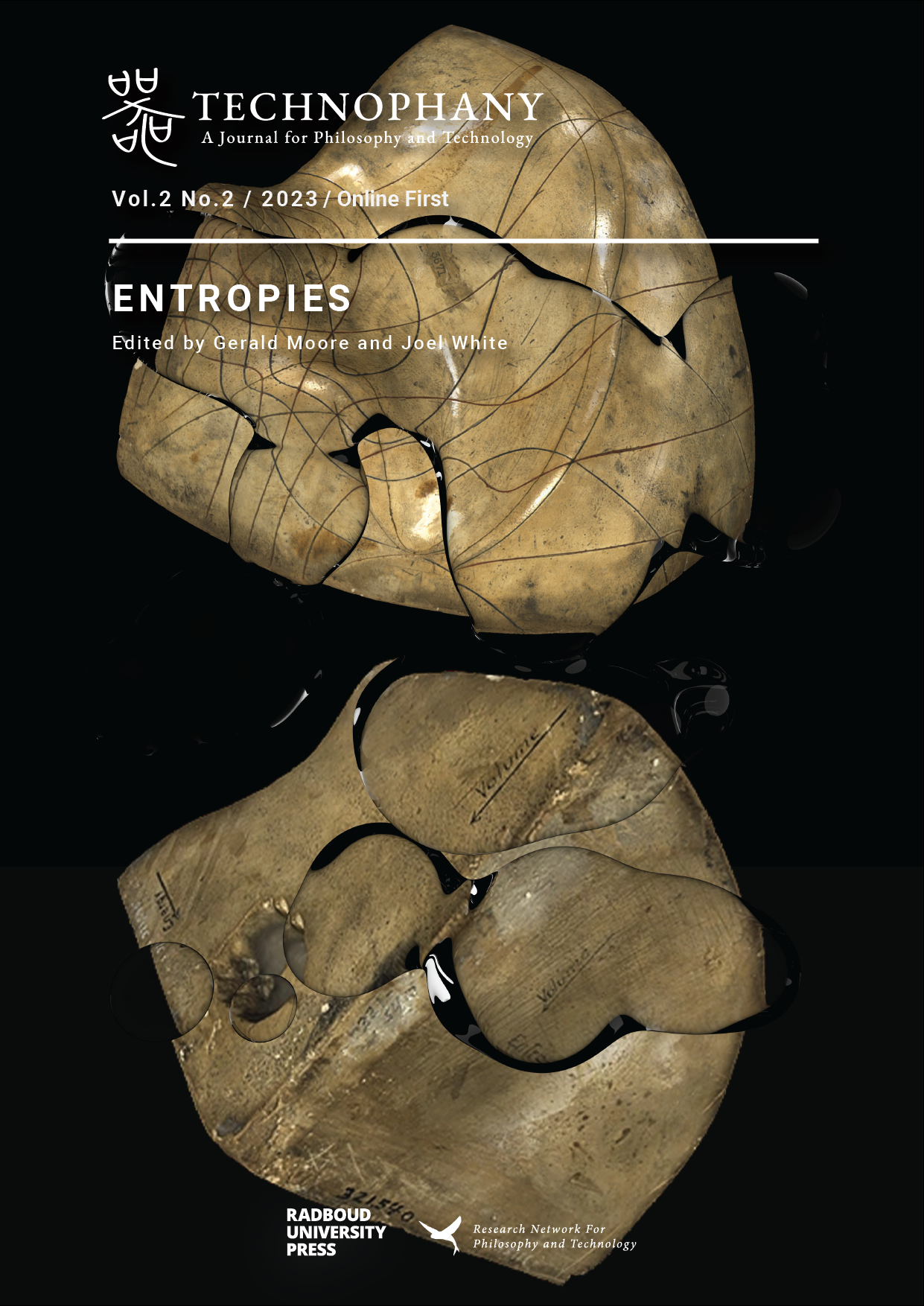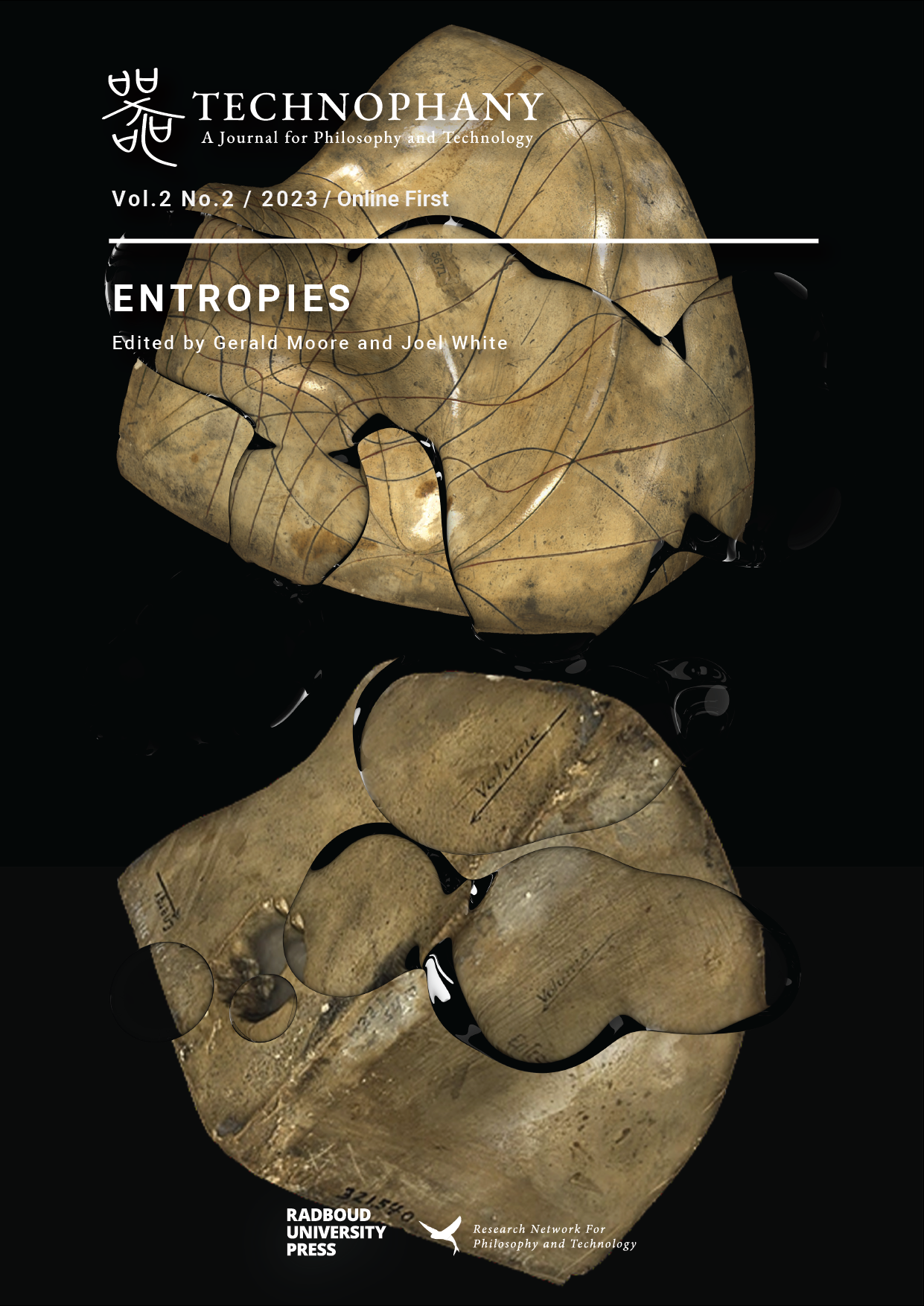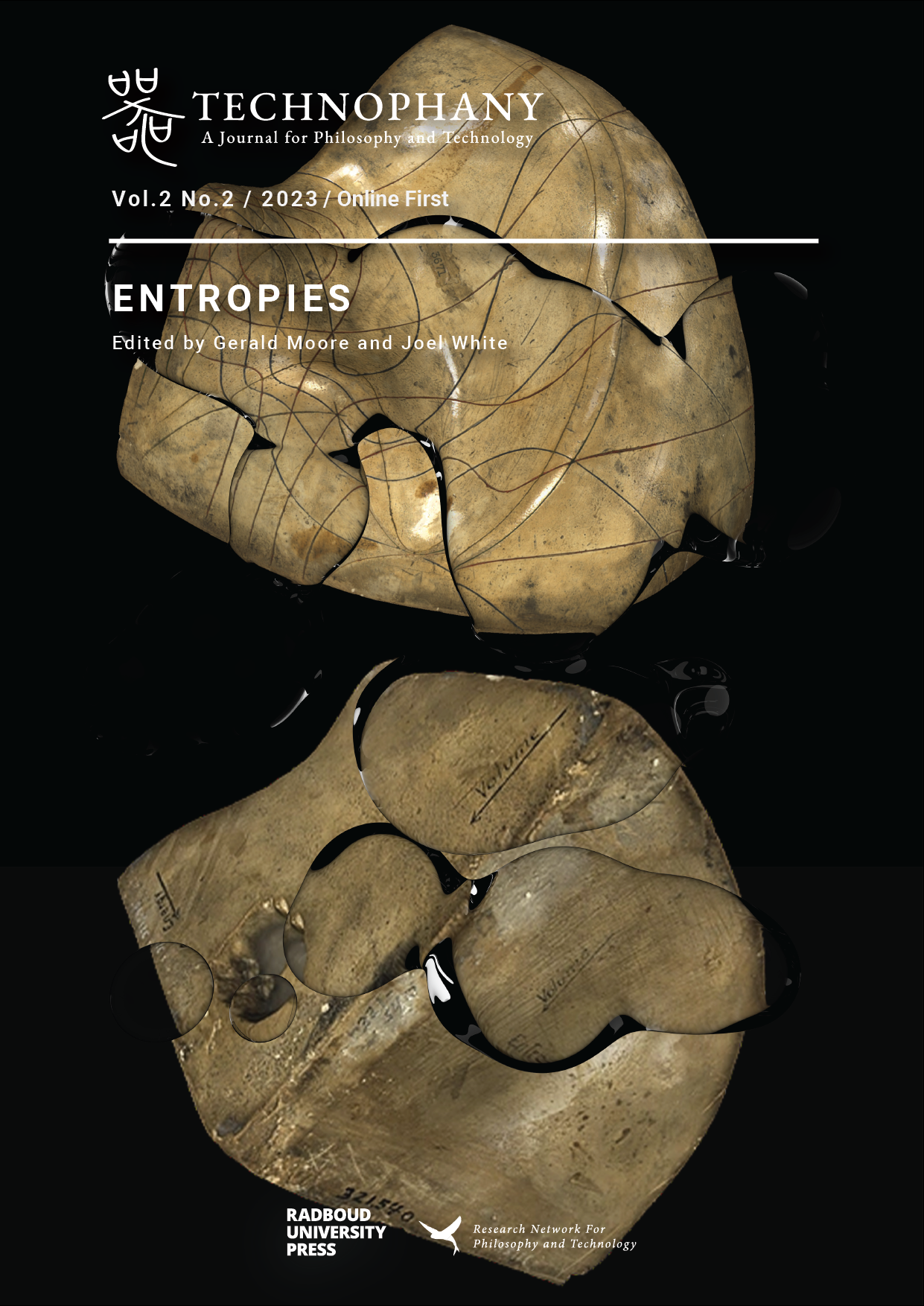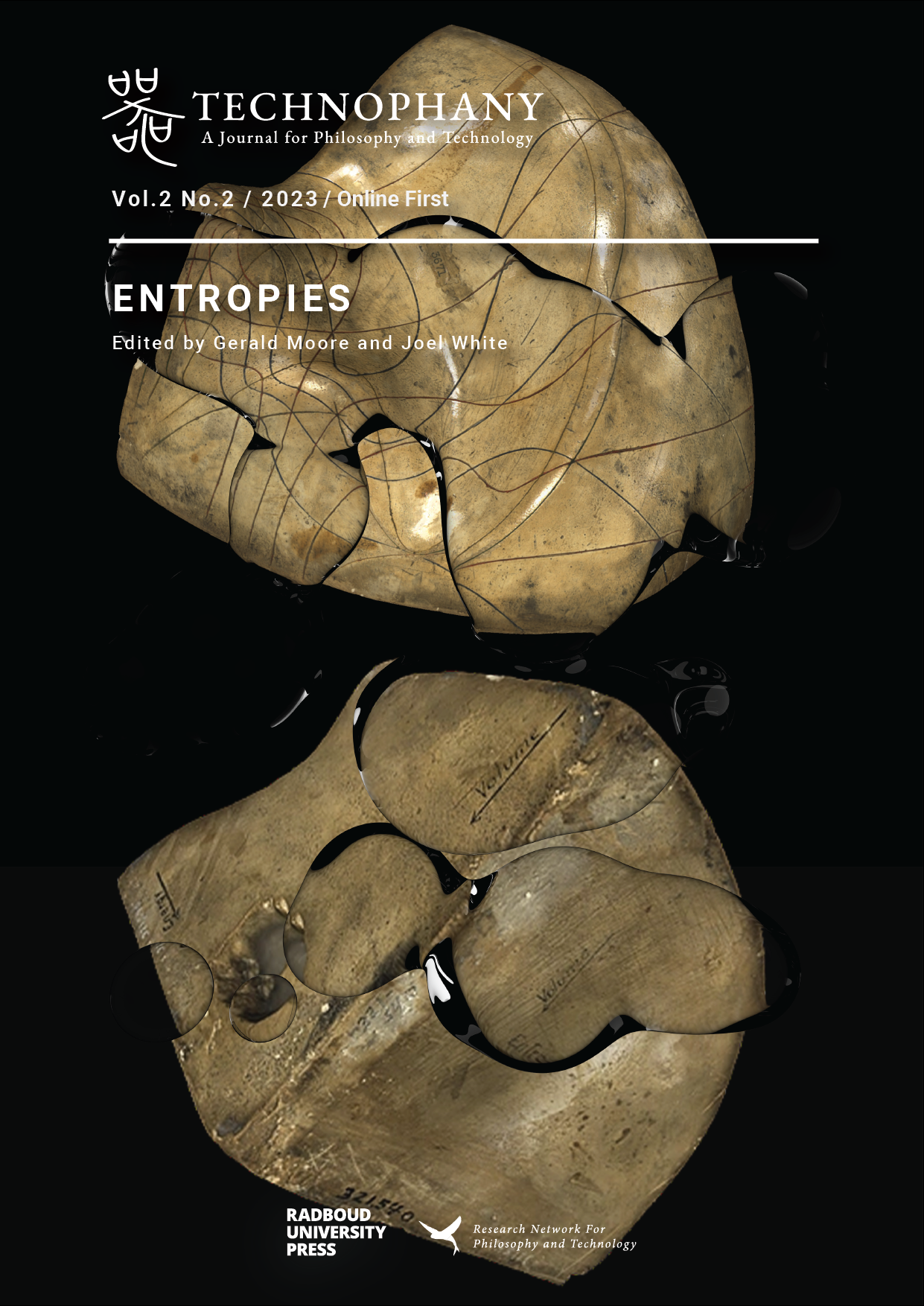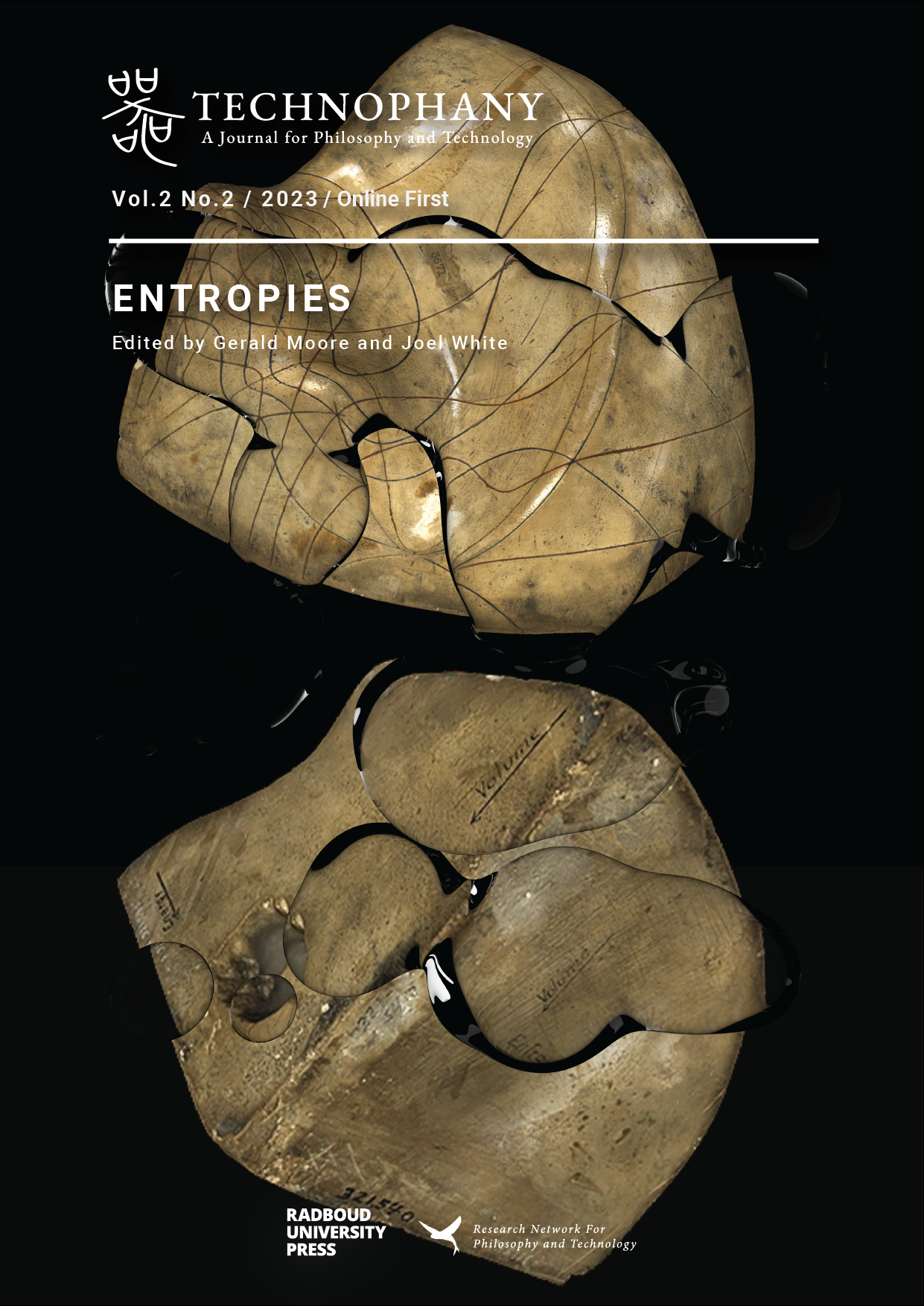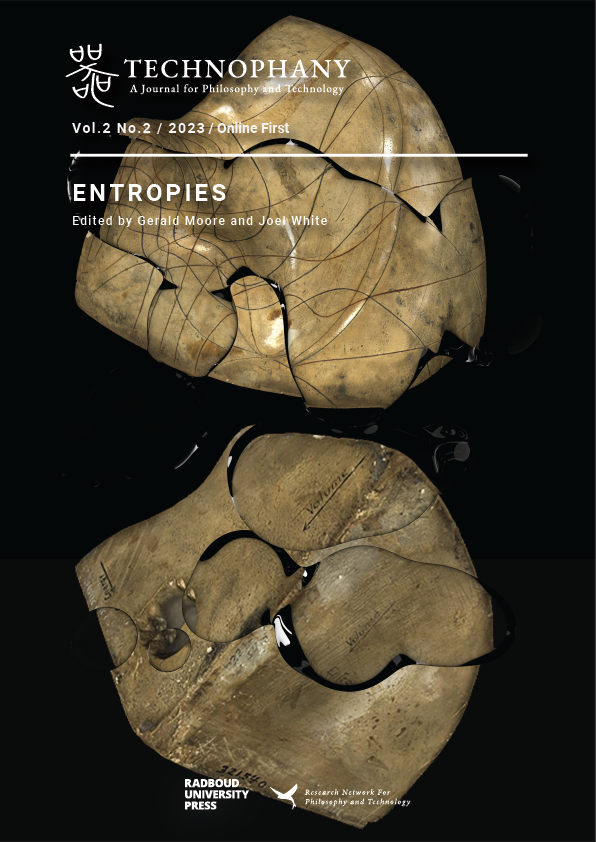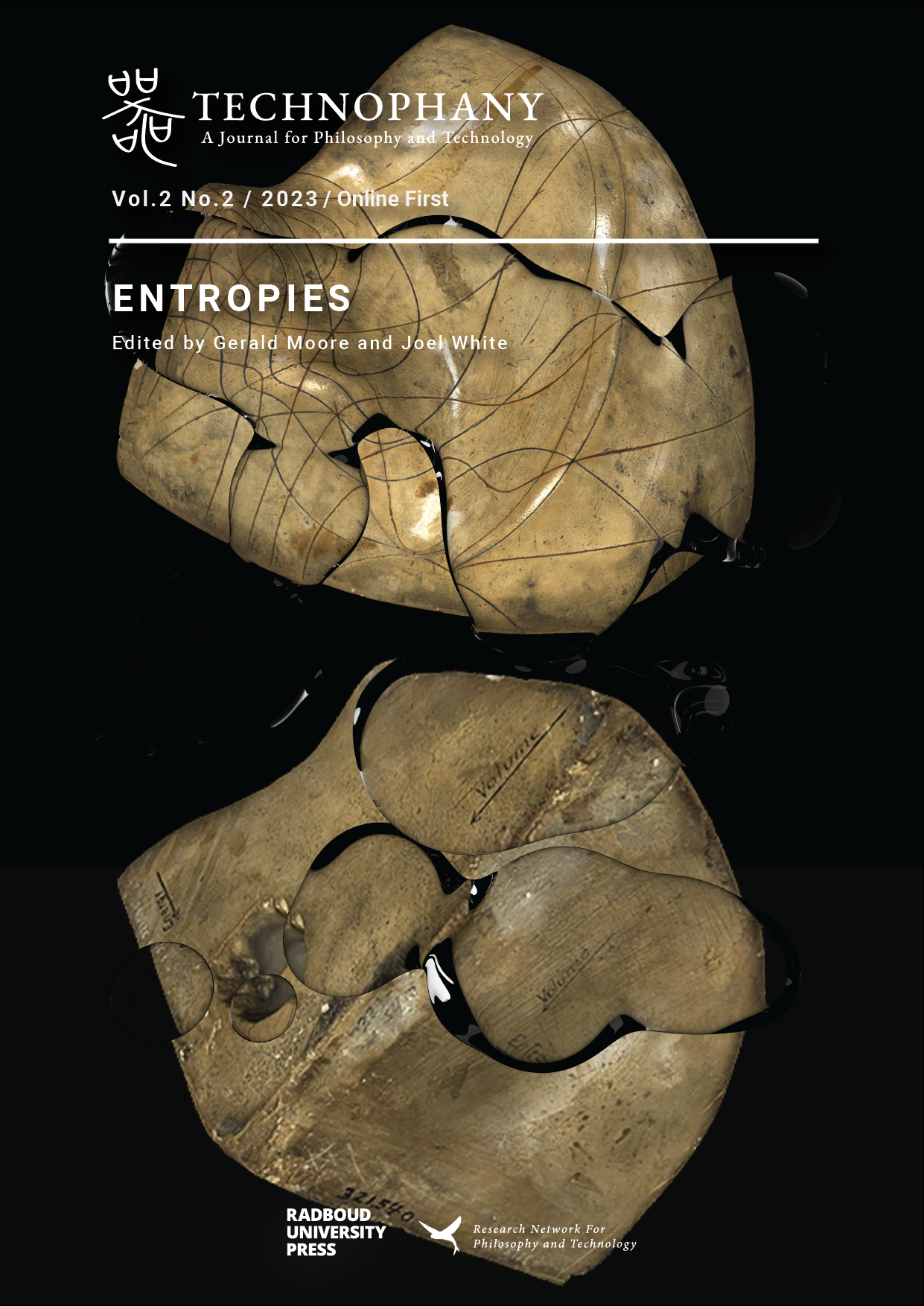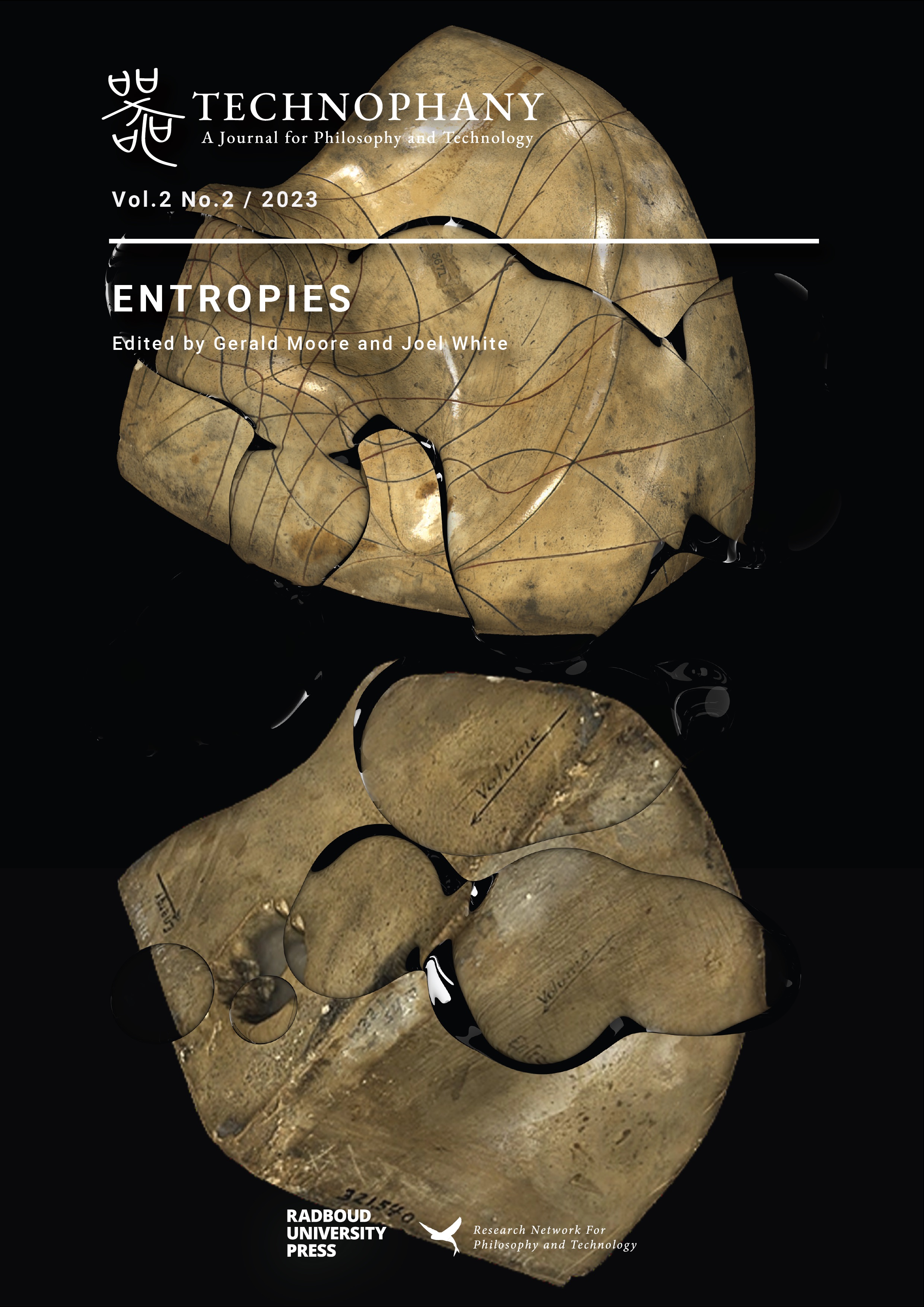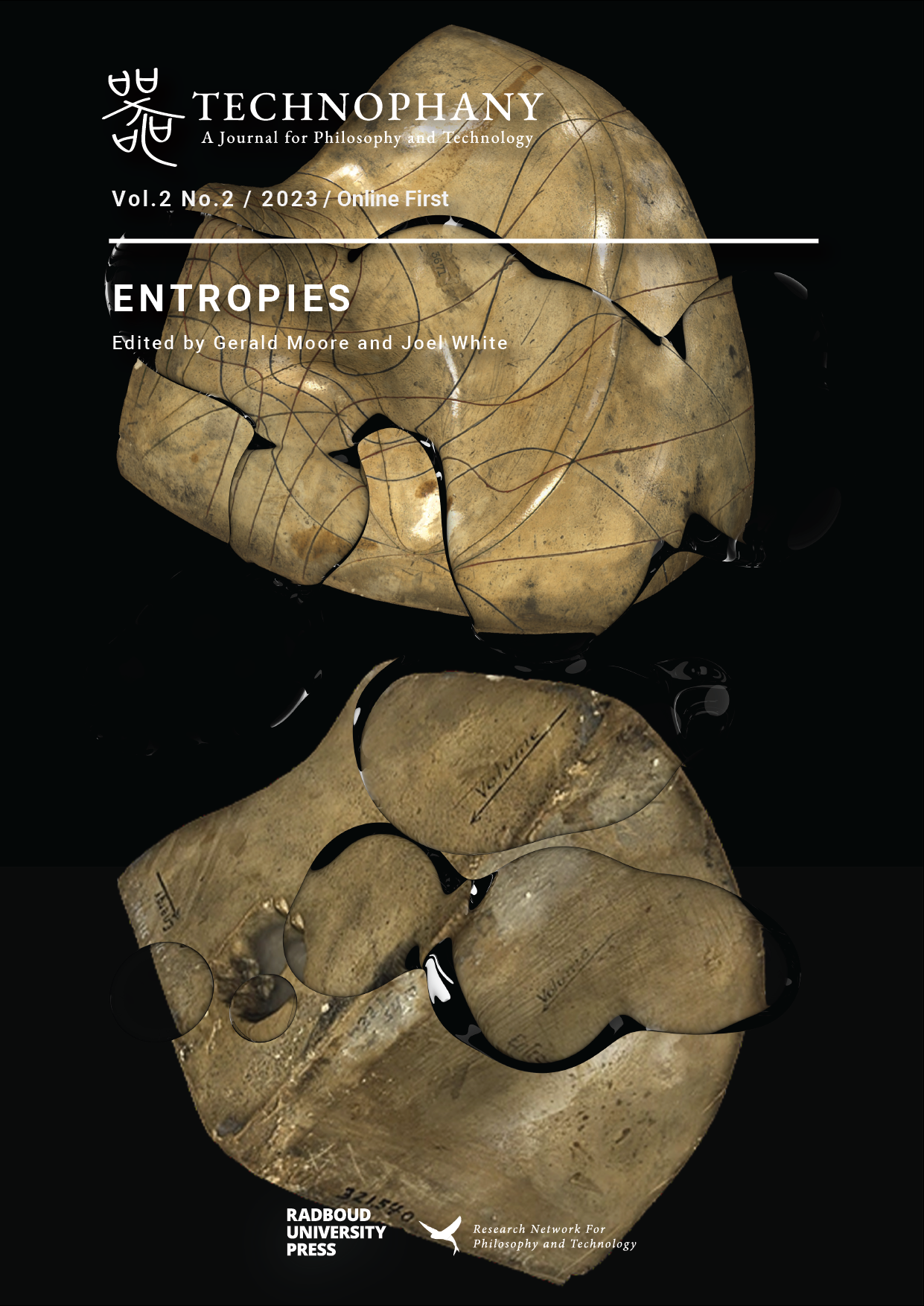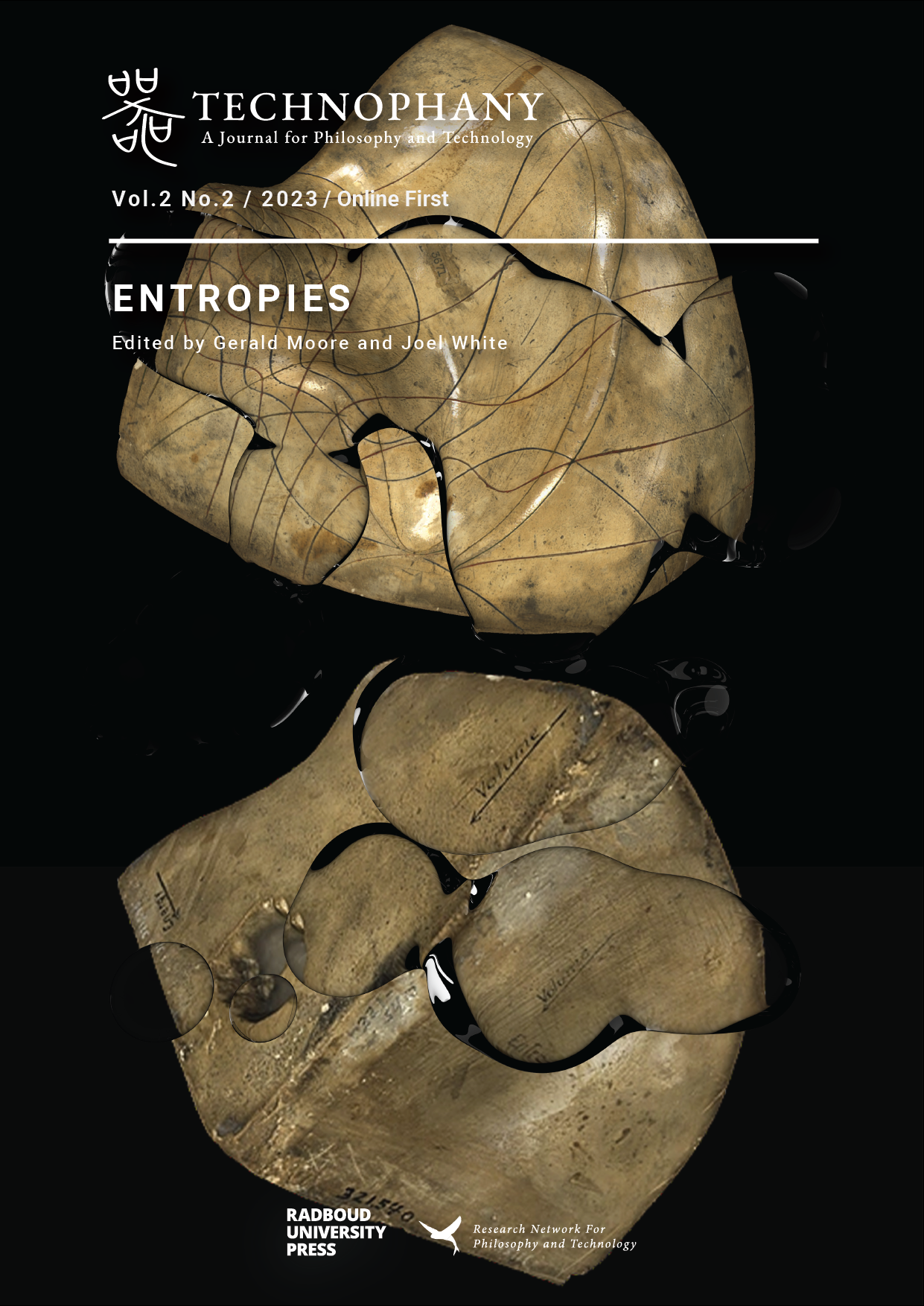Vol. 2 No. 2 (2024): Entropies
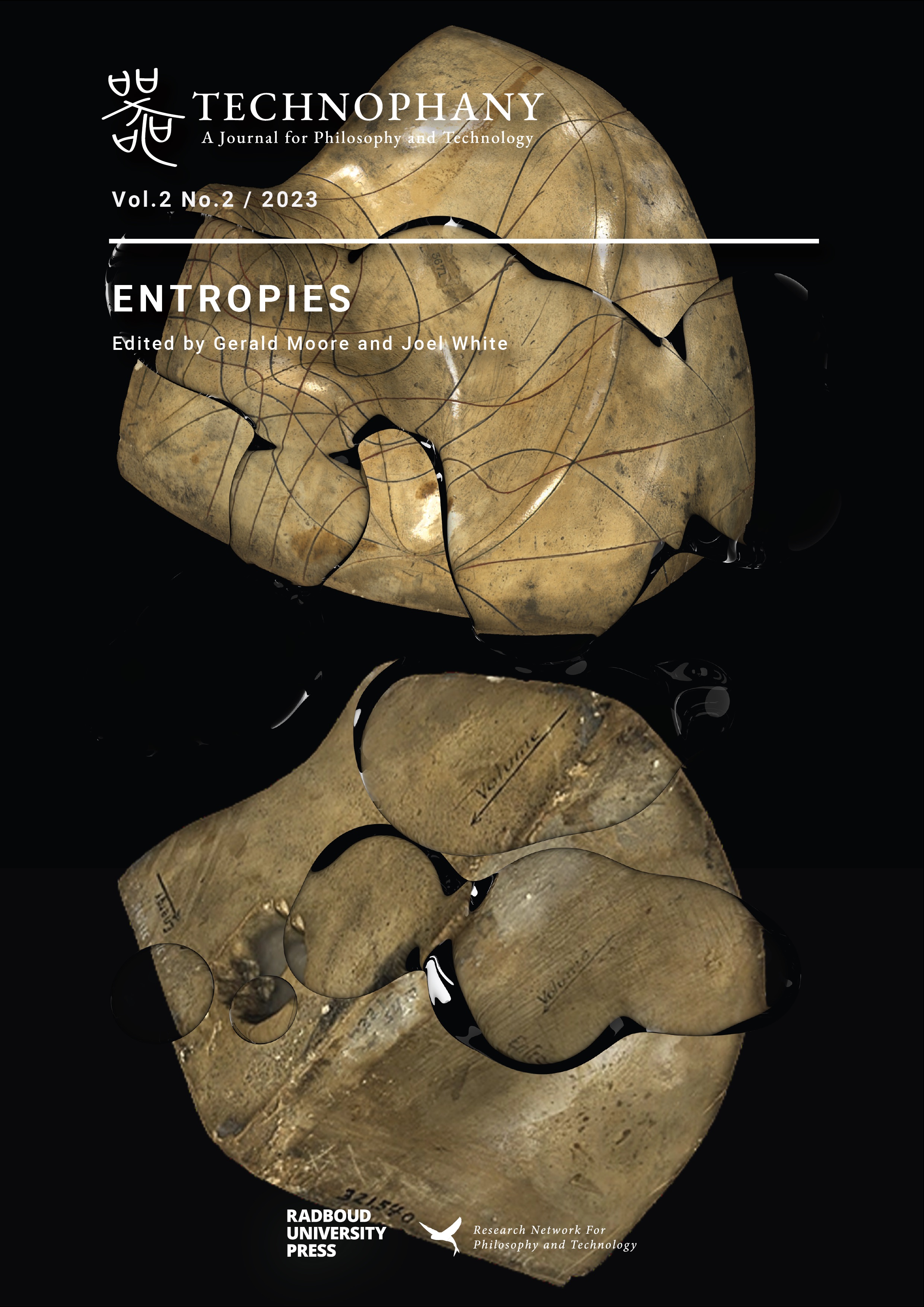
The “Entropies” special issue of Technophany offers insight into how and why the concept of entropy—inclusive of its many historical definitions, expressions, and mathematical formulations—raises fundamental philosophical questions and problems. The concept of entropy has had several major historical scientific iterations, the three major being classical thermodynamic, statistical mechanical and information theoretic. Instead of concentrating on one type of entropy. The articles collected are, therefore, of a broad nature, reflective of entropy’s conceptual plurality. The aim has been not to determine what entropy is—whether quantitively or qualitatively—but to consider how this equivocal concept problematises our relation to fundamental phenomena such as life and death, technology, time, chance, information, and the cosmos.
Full Issue
Entropies (Edited by Joel White and Gerald Moore)
-
A Moving and Exhausting Cosmos: A Discussion on Entropy
A discussion between Thomas Nail and Joel White on the philosophical status of entropy. The discussion explores Nail's kinetic materialism, movement, entropy and the notion of exhaustion.
-
Contributions to the Neganthropology Agroforestry and Syntropic Agriculture
The present text aims to discuss the proximity between two central concepts in the works of two authors: “syntropic agriculture” and the “Neganthropocene,” respectively in the works of Ernst Götsch and Bernard Stiegler. First, a review of the terminology of the terms “syntropy” and “negentropy” is carried out, establishing that the terms are quasi-synonymous. Secondly, a succinct explanation of syntropic agriculture as an “epistemological key” is offered, one very similar to that of Isabelle Stengers and Ilya Prigogine from Order out of Chaos. Second, an explanation of its origin in indigenous cosmology, as expressed by Viveiros de Castro in Cannibal Metaphysics, is outlined. Syntropic agriculture is one of the ramifications of techniques carried out in agroforestry systems and, therefore, is also called “successional agroforestry systems” (SAFs). It has been used not only for reforestation, but also for small and large-scale agricultural production. The big differences between syntropic agriculture and other agroforestry systems are how the biodiversity of cultivated species is emphasized and how ecological succession is used as a guide to cultivation. That is, syntropic agriculture mimics the processes carried out by ecological succession. The role of human beings is also great, given that the farmer needs to act constantly, intervening in cultivation, sowing, and pruning. Thus, syntropic agriculture establishes the height of syntropy when there is an organization similar to that of a forest, but above all similar to a forest in which man is properly equated. At this point, a parallel is drawn between this model of agriculture and that carried out by Amazonian indigenous peoples, which most likely gave rise to the Amazon Forest.
-
Towards a New Industrial Revolution? Entropy and its Challenges
This is a transcribed and translated a podcast of the interview concerning the 1st chapter of the book Biurquer: Il n’y a pas d’alternative [Bifurcate: There Is No Alternative] on the scientific, technological and political stakes of the notion of entropy. The discussion took place between Bernard Stiegler, Maël Montévil, Marie Chollat-Namy and Victor Chaix, on the 1st of July 2020.
-
Affirming Entropy
This paper challenges the frequent demonisation of entropy in discourses which attempt to draw a “naturalised” axiology from thermodynamics, information theory, and related sciences. Such discourses include Wiener’s cybernetics, Stiegler’s negathropology, and Floridi’s information ethics, in each of which entropy designates the evil which must be fought in the name of life, information, or some other notion of “the good.” The perspective the paper develops is Nietzschean. Nietzsche himself rejected the consequences of the Second Law, but I wish to argue that it is possible to affirm entropy, for Nietzschean reasons.
First, the paper argues that the reason Nietzsche rejected the Second Law is that it provides consolation for the pessimist (an argument made by von Hartmann). Eternal return should be affirmed because it is the more difficult position, and so provides the ultimate existential test. However, metaphysical and existential reasons must give way to the more recent scientific evidence, especially the dating of the universe, which undermines Nietzsche’s argument against heat death. While this is alone sufficient reason to affirm entropy, the position is supported by two further classes of reasons. First, the oppositions which whave supported the traditional ascription of values to negentropy and entropy can be challenged; and 2) entropy can be seen as consonant with the characteristics of existence which Nietzsche sought to affirm, especially becoming.
-
Dialectics of Entropy Notes on the Topology of Time
The 19th century saw a dramatic transformation in the basic categories of knowledge, both in metaphysics and in physics the notions of time and matter became intertwined, following the industrial revolution. In a crucial sense, both dialectical materialism and entropic physics reflect the changes induced by the industrial revolution. In this paper, I will examine the notion of entropy so as to form a dialectical concept of it. In doing so, I will relate dialectical materialism and entropy to demonstrate their shared ground. The goal of this will be to show what the consequences of the industrial revolution have been on the form of time itself. Rather than the formal time, linear time of Newtonian mechanics and Kant’s transcendental idealism, time today has become an unorientable surface, relating back to itself in important ways. Taking some topological ideas from Deleuze’s treatment of the third synthesis of time in Difference and Repetition (1969), as well as Žižek’s concept of dialectical materialism from Sex and the Failed Absolute (2019), I will show how these disparate notions of material time bear on the topology of time after the industrial revolution.
-
Human Aging and Entropy
In this paper I argue that the contemporary pathologizing of old age is directly tied to the notion of uselessness, understood entropically as that which cannot contribute energy for useful work. The elderly are configured as socially useless and thus threaten the health of the body politic. As a result, they are marginalized, ignored, and treated as waste to be jettisoned from the system. Because understanding bodies as machines able or unable to perform work accords with the second law of thermodynamics, the first half of this paper discusses entropy as both scientific law and philosophical concept. The second section explores the lived experience of aging and the pathologized position of social uselessness through Simone de Beauvoir’s analysis of old age. As she herself ages, the place of senescence comes to play a more pronounced role in her philosophical inquiry. Writing about the lived experience of aging adds a vital dimension to the scientific and philosophical perspectives, insofar as it foregrounds the various ways that entropy is felt: slowing, dissipating, and ultimately dying. While these should be viewed as part of the normal life cycle, they become markers of abjection which are judged harshly against the standard of social utility.
-
A Conceptual History of Entropies from a Stieglerian Point of View Epistemological and Economic Issues of the Entropocene
In this article I will try to suggest a transdisciplinary framework in order to analyse the contemporary ecological polycrisis which is usually described as the Entropocene era. According to French philosopher Bernard Stiegler, the Anthropocence can be understoodas an Entropocene, because the current ecological crisis consists in a process of massive increase of entropy in all its forms : thermodynamic entropy (that is, dissipation of physical or chemical energy), biological entropy (as the destruction of biodiversity), and psycho-social entropy (as the reduction of knowledge to data and calculations, through digital disruptive technologies). In order to analyze this situation, we need a transversal conception of entropy : from Bergson’s philosophy of life to Stiegler’s philosophy of technics, going through Schrodinger’s physics, Wiener’s cybernetics, Lotka’s biology and Levi-Strauss’s anthropology, I will try to build a conceptual history of entropies and to explore its economic and political consequences, in order to open new paths beyond the Entropocene era.In this article I will try to suggest a transdisciplinary conception of entropy in order to analyse the contemporary ecological polycrisis which is usually described as the Anthropocene era. According to French philosopher Bernard Stiegler, the Anthropocence can be understood as an Entropocene, becausethe current ecological crisis consists of a process of massive increases of entropy in all its forms: thermodynamic entropy (that is, dissipation of physical or chemical energy), biological entropy (as the destruction of biodiversity), and psycho-social entropy (as the reduction of knowledge to data and calculations, through digital disruptive technologies). In order to analyse this situation, we need a transversal conception of entropy: from Bergson’s philosophy of life to Stiegler’s philosophy of technics, through Schrodinger’s physics, Wiener’s cybernetics, Lotka’s biology and Levi-Strauss’s anthropology, I will try to build a conceptual history of entropies from a Stieglerian point of view and to explore its economic and political consequences in Stiegler’s thought, in order to open new paths beyond the Entropocene era.
-
Short-Circuits at the Speed of Anaphylaxis Politics, Law and the Fourth Kind of Memory
If, as Canguilhem argues, the emergence of exosomatic life involves the introduction of a new inconstancy into life’s environment, then both juridical and scientific law can be understood as a response that aims at a new constancy or fidelity, but one that always requires interpretation. Today, however, there is a crisis of law, due to a speed differential between the speed of legal change and the speed of digital network technology. This crisis can be understood in relation to Stiegler’s account of exosomatic life as involving three kinds of memory that struggle against the entropic tendency, but here we argue that there is also a fourth memory: the immune system. Taking this into account can further elucidate Stiegler’s claim that the pharmakon has a third, psychosocial dimension: the pharmakos. By understanding immune function not just as discriminating proper and foreign elements, or friend and enemy, but rather as a retentional and interpretive system, we can understand phenomena such as the designation of a scapegoat as a fault of interpretation that can be compared with accounts of the onset of paranoia. This in turn makes it possible to understand the crisis of contemporary experience as an anaphylactic reaction resulting from a collapse of resonance that amounts to a loss of the knowledge and desire required to live in tension, where the latter is the only meaningful definition of peace.
-
Diversity and Biocultural Invention
In non-modern biocultures, contextual human technicity has played a key role in shaping the behaviors and the morphology of non-human species, which in return has simultaneously modulated human morphology and behavior: behavior affords behavior. Studies intersecting anthropology and ecology have framed this process as a biological feedback in which species co-evolve through the constitution of biocultural diversification, thus producing negative entropy through technical activities.
-
The Thermodynamics of Life as a Speculative Model for Planetary Technology
Originating from nineteenth century physics, the concept of entropy—a measure of disorder, randomness, and/or the dissipation of useful energy—underlay a cosmology where order and complexity were seen as highly improbable phenomena in a universe tending toward chaos and disorganisation. Nearly a century later, theoretical frameworks were developed for understanding the production of entropy as an enabling feature of self-organized complexity in the natural world. These ideas would contribute to establishing connections between the origins, development, and evolution of life and the principles of a thermodynamic universe. For some, they also supplied the conceptual foundations for theorizing about a universal natural tendency driving the development of increasingly complex and ordered systems which amplify processes of entropy production and energy dissipation and dispersal. In this paper I chart a path through the aforementioned ideas and present their relevance in framing a relationship between our technological civilization and the Earth system. I then speculate about the prospect of a technosphere whose constitution and activity are aligned with thermodynamic principles of dissipation and entropy-production, drawing on theoretical biology and recent developments in bioengineering to envision a paradigm where technology becomes living matter itself.
-
Entropy and Negativity The Ecological Implications of Dialectics
Entropy, often defined negatively as disorder or randomness within a system, is vital for organisation while also posing a threat to cyclical reproduction. Entropy is not equivalent to disorganisation, but rather a source of creativity at the local level, even if the tendency towards entropy persists globally. In this article, we build upon Bernard Stiegler’s understanding of entropy, and argue that the interplay of entropy and anti-entropy can be comprehended through Hegel’s notion of negativity, and draw upon the organisational approach to biological systems, which introduces anti-entropy as akin to organisation. Thus, we address Stiegler’s lopsided criticisms of dialectical accounts and argue that the interplay between entropy and anti-entropy is inherently dialectical. We also employ the concept of habit to understand the dialectic of entropy and anti-entropy in the life of organisms, and the delicate balance between stability and plasticity that must be upheld for the thriving of both organisms and their environments.
-
On Entropy and Responsibility in the Thought of Ivan Illich
This paper aims to explore the concept of entropy in Ivan Illich’s overall thinking and deliver a dialog with other authors. Our goals are twofold. First, we aim at pointing out how Illich's early work is relevant for critically thinking about entropy in its relationship to forms of social organization and technology usage. Secondly, we point to how Illich’s later works consider a planetary responsibility. By gathering matter, energy and information, technology is an ambiguous force of both hominization and alienation, world-building and world destruction. For an early Illich, liberation from such new heteronomy was possible. The late Illich, however, adverts against the dangers of a collective responsibility. The attempt to “save life” is a necrophiliac manipulation, dependent on a planetary extension of promethean power. Instead, humankind must nurture the return of Epimetheus: a powerless relationship with the future that places hope as the constitutive force of social fabric.
-
Entropy, Said the Devil (Entropy & its Discontents: From Heat Death to the Eternal Return)
Appearing to channel the Devil himself, writer Dorion Sagan reports on a deep Earth conference where the former, with technical and philosophical rigor, expands upon Bernard Stiegler’s notion of the Entropocene, the “generalised anthropogenic acceleration in the rate of terrestrial entropization” from which “[m]any of the world’s current politico-ecological crises derive” (White and Moore, 2022). The apparently possessed writer, whose stenography of the deep Earth demon appears to be for self-aggrandizement as part of a suspected Mephistophelean pact, argues that Stiegler’s Entropocene is in fact a specific form of thermodynamic planetary dysfunction. Unlike some other global concerns analyzed by philosophers—e.g., Immanuel Kant’s inquiries into the possibilities of world peace, and speculations, following Fontenelle, on the existence of life on other planets—the analysis of Earth’s planetary condition, is not unique: it is an example of thermodynamic dysfunction in general, which has important and investigable precursors: forest ecosystems exposed to heat and radiation from nuclear runoff, nonliving complex systems (e.g., Bénard cells, Taylor vortices, “multiplying” typhoons, and long-lived autocatalytic Belousov-Zhabotinski chemical reactions) that exhibit physiological malaise, and ultimately “death,” when the temperature, pressure, or electron potential gradients upon which their organization depends become too steep or insufficient. Among the many interwoven themes discussed in one of the Devil’s “outer dens” are senescence, the checkered history and thermodynamic reality of entropy as a measure of the spread of energy, Nietzschean eternal recurrence, life on other planets, and the mythical heat death of the universe.
-
The Unbecoming of Being Thermodynamics and The Metaphysics and Ethics of Entropic Decay
Like the Copernican revolution which initiated the Modern project, there has been a thermodynamic revolution in the empirical sciences in the last two centuries. The aim of this paper is to show how we might draw from this revolution to make new and startling metaphysical and ethical claims concerning the nature and value of reality. To this end, this paper employs Aristotle’s account of the relation of the various philosophies and sciences to one another to show how we might assert a new theory of being, moral value, and practical action from the primacy of entropic decay asserted in the contemporary mathematical sciences. This paper proceeds to show how, from what the contemporary sciences have concluded concerning the primacy of entropic decay within reality, unbecoming might be forwarded as a new account of the essence of existence: i.e., the first cause and motivating principle of reality’s formal, material, efficient, and final nature. The paper concludes by arguing that a new and surprising account of universal ethical value and normative duty can be deduced from such a metaphysics of decay.
-
Entropy’s Critical Translations Following Serres’s Path through the North-West-Passage
It is, according to Serres, the ‘greatest discovery of history that entropy and information are connected’ – a line of thought he takes throughout epistemological questions, aesthetics, cultural analysis, and a theory of matter. By following Serres’s work, one finds negentropy, entropy, chaos, local orders, the ‘soft’, and the ‘hard’ almost everywhere in his writings. The intellectual context and sources that Serres draws on are an important support to understand the way in which the coupling of informational and thermodynamic entropy takes place, and how it becomes a key operator of entropic differentiation. This text draws a combinatorial map of how Serres connects understandings of entropy across a range of areas of knowledge. In this specific context, Serres’s path of translation harnesses the so-called ‘hard’ and the ‘soft’ forms of entropy in looking at literature and arts, yet also to discuss social phenomena and the formations of societies. By drawing attention to the negative spaces in Serres’s connective path of translating entropies, and in the course of reading his work in context with other philosophies of entropy, this section aims to explore Serres’s translations in the way it both connects and leaves gaps. Approaching Serres’s criticality in this way brings one to the critical, difficult, icy landscapes of the North-West-Passage and the role it plays in his work. The North-West-Passage epitomises a ‘method’ to conceive the difficult path between the natural sciences and the humanities – exactly the kind of path that ‘entropy’ often meanders on. In fact, entropy itself plays an important role in regard the icy landscape’s ecology, e.g. to the degree to which the passage is melted or frozen, and thus, to the possibility of the passage as such. By bringing these multi-layered aspects of entropy as a material, aesthetic, and critical factor together, this contribution places Serres’s take on entropy as an eco-critical path in the face of the melting of icy landscapes.



